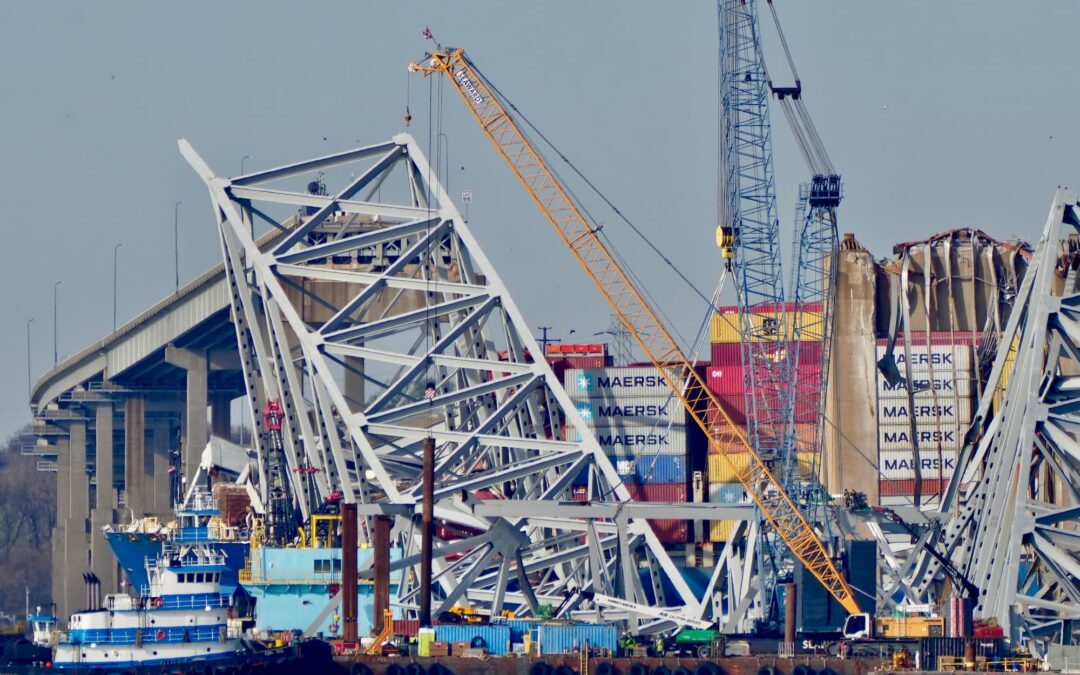In the last few weeks, the Francis Scott Key Bridge collapse has led to persisting delays in Baltimore trucking. On March 26th, a containership struck the Baltimore Key Bridge before falling into the Patapsco River. The bridge is a primary entryway into the Port of Baltimore and is significant for international and domestic shipping. Along with the Port of Baltimore being a major RoRo port, it is also a prominent importer of dry-bulk cargo. Because of its importance in cargo movement, the fall of the Baltimore Key Bridge has considerably impacted extensive supply chains. Truckers and shippers around the area have felt the strain of persistent slowdowns.
Why are Delays in Baltimore Trucking Persisting?
The collapse of the Baltimore Key Bridge is resulting in increased truck driving times around the region. Recent data compiled by the FMSCA (Federal Moter Safety Administration) notes traffic times for different routes to the port. Local traffic in the Baltimore Harbor Tunnel was up 20%, and 18% in the Fort McHenry Tunnel. Traffic for Baltimore and neighboring cities like Philadelphia, New York, Baltimore, and Washington rose. Long-haul trucking was over 20% in both tunnels compared to the average times. Since the Port of Baltimore is a significant hub for shipping automobiles and other cargo, the high volume of carriers rerouting is causing delays.
Similarly to trucking, delays are expanding to other supply chain parts. Businesses that rely on shipments moving to and from the Port of Baltimore are negatively impacted. The Small Business Association (SBA) notes that more than 1000 businesses in the Baltimore region have applied for emergency loans. Customers are affected by prolonged delivery times as well. In response, shippers are rerouting their shipments to nearby and far ports that can handle the cargo. Along with redirecting cargo movement, disruptions from the collapse result in cancellations, impacting truck companies. A nearby carrier reported that the incident canceled 30 out of 50 orders.
The FMCSA Is Offering Resources To Navigate The Collapse
In response to the collapse, the FMCSA has offered various resources to truckers and shippers. An emergency declaration issued by the FMCSA has added two hours to the 11-hour driving limit. The extension is for carriers that must divert their cargo to different ports. The extension also includes trucks carrying fuel to nearby counties and the transportation of cargo related to immediate collapse response. Along with extended time, the declaration does not require short-haul drivers to install ELDs (Electronic Logging Devices). ELDs monitor the hours that the drivers are on the road. FMCSA also has social media for agencies that are responding to the bridge collapse.
With the complete impact of the bridge collapse still not felt on shipping, protecting supply chains is essential for shippers. They should be up-to-date with any updates regarding the issue by checking the websites and news reports. It is also crucial to understand where the traffic is and where the alternate routes are. Another way that shippers can navigate the trucking disruptions is by using the help of a freight broker. Brokers coordinate cargo movement for the shipper and find solutions for what may arise during the journey. Call A1 Freight Solutions at 786-756-8795 to speak to our experienced freight brokers regarding the transport of your shipment.

